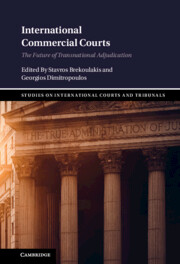Book contents
- International Commercial Courts
- Studies on International Courts and Tribunals
- International Commercial Courts
- Copyright page
- Contents
- Contributors
- Foreword
- Preface
- International Commercial Courts: The Future of Transnational Adjudication – An Introduction
- Part I A Contextual Perspective to International Commercial Courts
- Part II Jurisdiction, Applicable Law and Enforcement of Judgments
- Part III Procedure, Function, Organization
- 10 The Design of International Commercial Courts
- 11 Internationalizing Domestic Courts in Europe
- 12 The Legitimacy and Ethics of International Commercial Court Judges
- 13 Counsel Ethics in Transnational Lawyering
- 14 The Use of Technology at International Commercial Courts
- Part IV The Interplay between International Commercial Courts and Other Dispute Resolution Fora
- Part V International Commercial Courts and Global Governance
- Index
10 - The Design of International Commercial Courts
From Organizational Hybridity to Functional Interoperability
from Part III - Procedure, Function, Organization
Published online by Cambridge University Press: 14 April 2022
- International Commercial Courts
- Studies on International Courts and Tribunals
- International Commercial Courts
- Copyright page
- Contents
- Contributors
- Foreword
- Preface
- International Commercial Courts: The Future of Transnational Adjudication – An Introduction
- Part I A Contextual Perspective to International Commercial Courts
- Part II Jurisdiction, Applicable Law and Enforcement of Judgments
- Part III Procedure, Function, Organization
- 10 The Design of International Commercial Courts
- 11 Internationalizing Domestic Courts in Europe
- 12 The Legitimacy and Ethics of International Commercial Court Judges
- 13 Counsel Ethics in Transnational Lawyering
- 14 The Use of Technology at International Commercial Courts
- Part IV The Interplay between International Commercial Courts and Other Dispute Resolution Fora
- Part V International Commercial Courts and Global Governance
- Index
Summary
International commercial courts are ‘international’ in that they perform functions that may be characterized as international. First, all ICommCs of the three categories presented in the chapter are domestic courts for international commercial disputes, or international business, more broadly defined. Second, they allow the internationalization of domestic legal orders by helping a jurisdiction attract foreign capital, and become a global and regional dispute resolution hub. ICommCs’ functional internationalism spills over into their organizational and procedural design. While ICommCs may be seen as hybrid institutions – between the national and the international, the public and the private, the formal and the informal – the chapter brings to light the new institutional mechanisms of interoperability between them and other dispute resolution fora – domestic courts, international commercial arbitration and international courts and tribunals. The functional interoperability will eventually determine the durability of ICommCs.
Keywords
- Type
- Chapter
- Information
- International Commercial CourtsThe Future of Transnational Adjudication, pp. 251 - 277Publisher: Cambridge University PressPrint publication year: 2022



